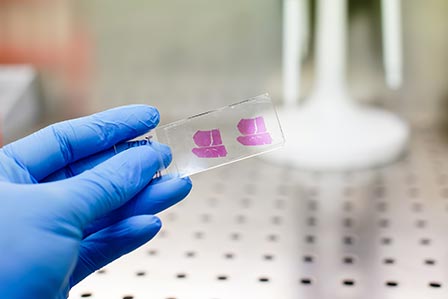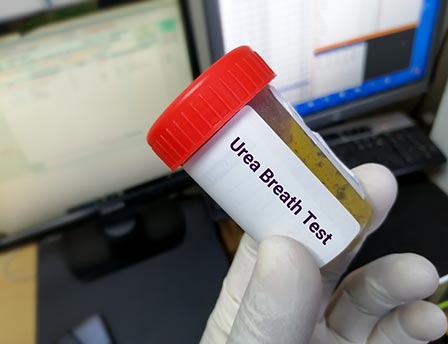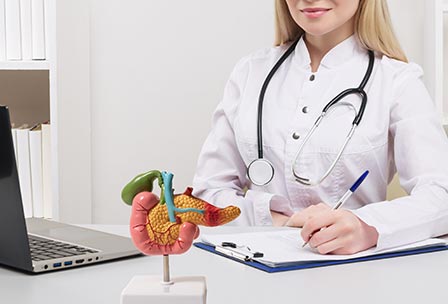Other Tests
We provide the following services:

Liver Biopsy
At ELEVATE Gastroenterology, we specialize in offering comprehensive digestive care and advanced diagnostic services, including the highly beneficial procedure called liver biopsy.
Liver biopsy is a medical procedure used to obtain a small sample of liver tissue for diagnostic evaluation. It involves the insertion of a needle through the skin and into the liver to collect a tissue sample, which is then analyzed under a microscope.
Liver biopsy offers several benefits in the diagnosis and management of liver diseases. It provides valuable information about the liver's structure, function, and the presence of any abnormalities. This helps doctors determine the cause, stage, and severity of liver diseases, such as hepatitis, cirrhosis, or fatty liver disease.
By obtaining a liver tissue sample, biopsy aids in the identification of specific liver conditions, differentiating between different types of liver diseases and guiding treatment decisions. It can help assess the extent of liver damage, monitor disease progression, and evaluate the response to therapies.
Liver biopsy is a relatively safe procedure when performed by experienced healthcare professionals. It is typically done under local anesthesia or mild sedation, minimizing discomfort for the patient. Advances in imaging technology, such as ultrasound guidance, have improved the accuracy and safety of liver biopsies.
Overall, liver biopsy is a valuable diagnostic tool that provides critical information about liver health and helps guide treatment decisions. It assists in the identification and management of liver diseases, enabling gastroenterologists to deliver appropriate and targeted care to patients.
At ELEVATE Gastroenterology, we prioritize your comfort, safety, and the effective management of your digestive health. Trust our skilled medical team to deliver exceptional care through state-of-the-art procedures like liver biopsy. Contact us to schedule your appointment and take a proactive step towards your digestive health.

Urea Breath Test (UBT)
Breath testing is a diagnostic procedure commonly performed in gastroenterology clinics to evaluate various gastrointestinal conditions, including Helicobacter pylori infection. This non-invasive test involves measuring the levels of specific gases in a patient's breath after ingesting a particular substrate.
Urea breath test (UBT) is primarily employed to detect the presence of Helicobacter pylori (H. pylori) infection, a common cause of gastritis and peptic ulcers. In this test, the patient consumes a urea solution containing a special carbon isotope. If H. pylori is present in the stomach, it produces an enzyme that breaks down the urea, releasing labeled carbon dioxide. The exhaled breath is then analyzed for the presence of this labeled carbon dioxide, indicating the presence of the infection.
Breath testing offers several advantages, including its non-invasiveness, convenience, and ability to provide real-time results. It helps in diagnosing specific gastrointestinal conditions, allowing healthcare professionals to develop targeted treatment plans and improve patient outcomes.
In summary, breath testing is a valuable tool in the gastroenterology clinic, providing non-invasive diagnostic information about H. pylori infection. By measuring specific gases in a patient's breath, this test assists in identifying underlying gastrointestinal conditions and guiding appropriate treatment strategies.
At ELEVATE Gastroenterology, we prioritize your comfort, safety, and the effective management of your gastrointestinal health. Trust our skilled medical team to deliver exceptional care through state-of-the-art imaging tests like urea breath test. Contact us to schedule an appointment and take a proactive step towards your digestive health.

Blood Tests
At ELEVATE Gastroenterology, we offer and utilize blood tests which are valuable for assessing and monitoring patients’ digestive health. Blood tests can provide critical information for diagnosing and managing gastrointestinal conditions. The significance of some common blood tests for digestive health includes:
- Full or Complete Blood Count (FBC or CBC): Identifies anemia due to gastrointestinal bleeding or other causes, helping investigate the underlying condition.
- Liver Function Tests (LFTs): For assessment of liver health and inflammation and evaluation for gallstone or other bile duct pathology; crucial for overall digestion.
- C-reactive Protein (CRP) and Erythrocyte Sedimentation Rate (ESR): Helps diagnose and monitor inflammatory digestive conditions.
- Serological Tests for Celiac Disease: Detects antibodies indicating celiac disease, allowing for diagnosis and early management.
- Amylase and Lipase: Measures pancreas digestive enzymes to evaluate for pancreas activity and inflammation, important for digestive issues.
- Vitamin and Mineral Levels: Identifies deficiencies linked to gut malabsorption disorders.
- Thyroid Function Tests: For the diagnosis and management of thyroid-related digestive issues.
- Electrolytes: For evaluation of overall digestive system health, motility, and function.
- GI Tumor Markers: Helps to diagnose, monitor, and manage gastrointestinal malignancies.
At ELEVATE Gastroenterology, we prioritize your comfort, safety, and effective management of your gastrointestinal health. Trust our skilled medical team and state-of-the-art laboratory tests. Contact us to schedule an appointment to take a proactive step towards your digestive health.

At ELEVATE Gastroenterology, we specialize in offering comprehensive digestive care and advanced diagnostic services, including the highly beneficial procedure called liver biopsy.
Liver biopsy is a medical procedure used to obtain a small sample of liver tissue for diagnostic evaluation. It involves the insertion of a needle through the skin and into the liver to collect a tissue sample, which is then analyzed under a microscope.
Liver biopsy offers several benefits in the diagnosis and management of liver diseases. It provides valuable information about the liver's structure, function, and the presence of any abnormalities. This helps doctors determine the cause, stage, and severity of liver diseases, such as hepatitis, cirrhosis, or fatty liver disease.
By obtaining a liver tissue sample, biopsy aids in the identification of specific liver conditions, differentiating between different types of liver diseases and guiding treatment decisions. It can help assess the extent of liver damage, monitor disease progression, and evaluate the response to therapies.
Liver biopsy is a relatively safe procedure when performed by experienced healthcare professionals. It is typically done under local anesthesia or mild sedation, minimizing discomfort for the patient. Advances in imaging technology, such as ultrasound guidance, have improved the accuracy and safety of liver biopsies.
Overall, liver biopsy is a valuable diagnostic tool that provides critical information about liver health and helps guide treatment decisions. It assists in the identification and management of liver diseases, enabling gastroenterologists to deliver appropriate and targeted care to patients.
At ELEVATE Gastroenterology, we prioritize your comfort, safety, and the effective management of your digestive health. Trust our skilled medical team to deliver exceptional care through state-of-the-art procedures like liver biopsy. Contact us today to schedule your appointment and take a proactive step towards your digestive health.
Breath testing is a diagnostic procedure commonly performed in gastroenterology clinics to evaluate various gastrointestinal conditions, including Helicobacter pylori infection. This non-invasive test involves measuring the levels of specific gases in a patient's breath after ingesting a particular substrate.
Urea breath test (UBT) is primarily employed to detect the presence of Helicobacter pylori (H. pylori) infection, a common cause of gastritis and peptic ulcers. In this test, the patient consumes a urea solution containing a special carbon isotope. If H. pylori is present in the stomach, it produces an enzyme that breaks down the urea, releasing labeled carbon dioxide. The exhaled breath is then analyzed for the presence of this labeled carbon dioxide, indicating the presence of the infection.
Breath testing offers several advantages, including its non-invasiveness, convenience, and ability to provide real-time results. It helps in diagnosing specific gastrointestinal conditions, allowing healthcare professionals to develop targeted treatment plans and improve patient outcomes.
In summary, breath testing is a valuable tool in the gastroenterology clinic, providing non-invasive diagnostic information about H. pylori infection. By measuring specific gases in a patient's breath, this test assists in identifying underlying gastrointestinal conditions and guiding appropriate treatment strategies.
At ELEVATE Gastroenterology, we prioritize your comfort, safety, and the effective management of your gastrointestinal health. Trust our skilled medical team to deliver exceptional care through state-of-the-art imaging tests like urea breath test. Contact us today to schedule an appointment and take a proactive step towards your digestive health.
At ELEVATE Gastroenterology, we offer and utilize blood tests which are valuable for assessing and monitoring patients’ digestive health. Blood tests can provide critical information for diagnosing and managing gastrointestinal conditions. The significance of some common blood tests for digestive health includes:
- Full or Complete Blood Count (FBC or CBC): Identifies anemia due to gastrointestinal bleeding or other causes, helping investigate the underlying condition.
- Liver Function Tests (LFTs): For assessment of liver health and inflammation and evaluation for gallstone or other bile duct pathology; crucial for overall digestion.
- C-reactive Protein (CRP) and Erythrocyte Sedimentation Rate (ESR): Helps diagnose and monitor inflammatory digestive conditions.
- Serological Tests for Celiac Disease: Detects antibodies indicating celiac disease, allowing for diagnosis and early management.
- Amylase and Lipase: Measures pancreas digestive enzymes to evaluate for pancreas activity and inflammation, important for digestive issues.
- Vitamin and Mineral Levels: Identifies deficiencies linked to gut malabsorption disorders.
- Thyroid Function Tests: For the diagnosis and management of thyroid-related digestive issues.
- Electrolytes: For evaluation of overall digestive system health, motility, and function.
- GI Tumor Markers: Helps to diagnose, monitor, and manage gastrointestinal malignancies.
At ELEVATE Gastroenterology, we prioritize your comfort, safety, and effective management of your gastrointestinal health. Trust our skilled medical team and state-of-the-art laboratory tests. Schedule an appointment today to take a proactive step towards your digestive health.
